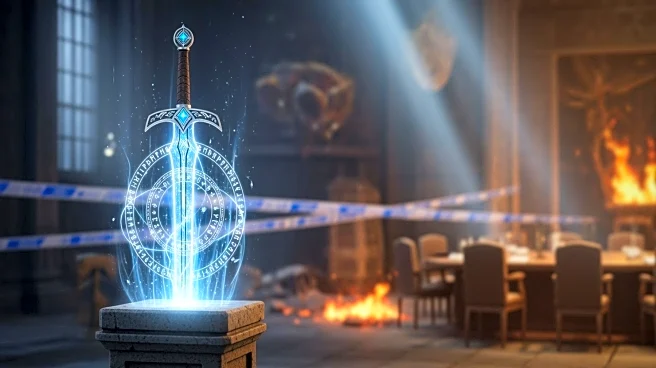What's Happening?
In the popular roguelike game Megabonk, players are faced with the challenge of unlocking the Hero Sword, a highly coveted weapon. The process to obtain this sword is notably difficult, requiring players to defeat a Stage Boss without picking up any items,
using power-ups, or interacting with various shrines. This includes avoiding Succ Shrines, Moai Shrines, Greed Shrines, Challenge Shrines, and Boss Curse Shrines. Players can accept upgrades through leveling up, which are essential for gaining the strength needed to defeat the Stage Boss. The game encourages players to break pots and collect gold, but warns against purchasing items from the Shady Guy or chests, as this would compromise their ability to unlock the Hero Sword. Once unlocked, the sword can be purchased for 30 silver in the Unlocks screen.
Why It's Important?
The challenge of unlocking the Hero Sword in Megabonk adds a layer of complexity and strategy to the game, appealing to completionists and players seeking a more difficult gaming experience. This task requires players to carefully plan their approach, optimizing their build and gameplay tactics. The difficulty of the challenge may increase player engagement and retention, as gamers strive to achieve this goal. Additionally, the game's design encourages players to explore different strategies and improve their skills, potentially enhancing their overall gaming experience and satisfaction.
What's Next?
Players who successfully unlock the Hero Sword may look forward to utilizing its capabilities in future game runs, potentially altering their gameplay strategies. The game's developers might continue to introduce similar challenges to keep the player base engaged and to maintain interest in the game. As players share their experiences and strategies online, a community of gamers may form around these challenges, fostering collaboration and competition.
Beyond the Headlines
The challenge of unlocking the Hero Sword in Megabonk reflects broader trends in gaming where developers create intricate tasks to enhance player engagement. This approach can lead to increased community interaction and the sharing of strategies, contributing to the game's longevity and popularity. It also highlights the evolving nature of game design, where player skill and strategy are increasingly emphasized.
















